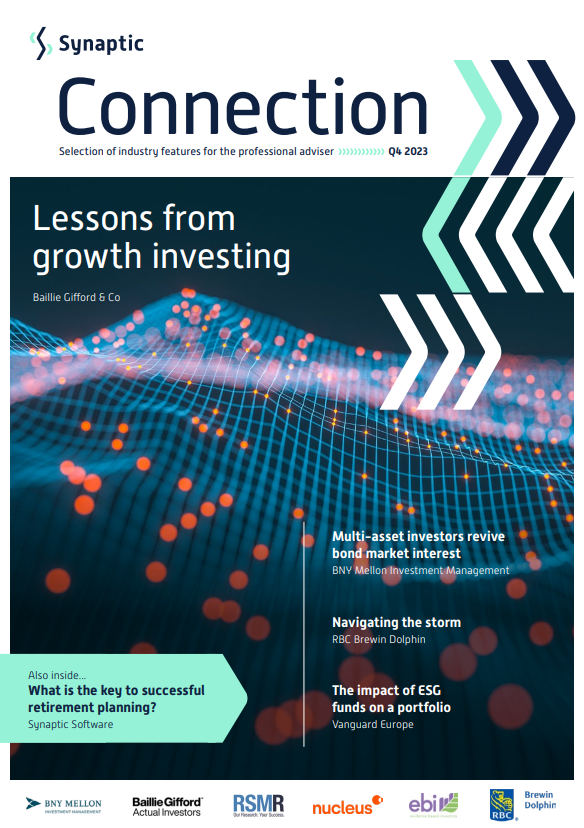In this edition...
- Lessons from growth investing Mark Urquhart, Partner Baillie - Gifford & Co
- I know pensions, but I wouldn’t tackle retirement income planning without a financial adviser Andrew Tully, Technical Services Director - Nucleus
- Multi-asset investors revive bond market interest Paul Flood, Head of Mixed Assets Investment - Newton Investment Management, part of BNY Mellon Investment Management
- Navigating the storm with Voyager Funds Antony Champion, Head of Intermediaries - RBC Brewin Dolphin
- What's the impact of ESG funds on a portfolio? Andreas Zingg, Head of Multi-Asset Solutions - Vanguard Europe
- Unprecedented climatic changes set new records Jonathan Griffiths, CFA Investment Product Manager - ebi
- Global market update Graham O’Neill, Senior Investment Consultant - RSMR
- Retirement income that flies in the face of market uncertainty Yannis Katsis, Business Development Director - Just Group
- What is the key to successful retirement planning? Good research, due diligence and above all, flexibility. Eric Armstrong, Client Director - Synaptic
- Hours to minutes ,
- The first rule of financial planning: insure the breadwinner ,
 Through a range of activities over centuries, including burning fossil fuels, deforestation, and changing land use, humans have released (and continue to release) large amounts of CO2 and other greenhouse gases (GHGs) into the atmosphere, while reducing the earth’s ability to manage these GHGs. This is leading to significant changes in the earth’s climate system, and is having an increasing impact on natural and human systems all over the planet.
Through a range of activities over centuries, including burning fossil fuels, deforestation, and changing land use, humans have released (and continue to release) large amounts of CO2 and other greenhouse gases (GHGs) into the atmosphere, while reducing the earth’s ability to manage these GHGs. This is leading to significant changes in the earth’s climate system, and is having an increasing impact on natural and human systems all over the planet.
2023 has brought with it a series of frightening climate-related events and records being broken. Here’s just a few:
› July 2023 was the hottest month ever recorded (both in terms of global air temperatures and global ocean surface temperatures)1 , with the average global temperature around 0.72°C warmer than the 1991-2020 average for July, 0.33°C warmer than the previous warmest month (July 2019). This may quite possibly lead to 2023 taking the record for the hottest ever, by the end of the year.
› Record flooding, heatwaves, and wildfires affected large parts of North America, Europe and Asia in July, with Canada’s 2023 wildfire emissions standing at more than double the previous annual record2 .
› Antarctica’s August sea ice level was 2.4 million square kilometers below the 1991-2020 average, or put another way the Antarctic has lost ice equivalent to an area more than 5 times the size of the UK3 . These changes have an impact at a global climate level – contributing to rising sea levels, while also leading to more solar radiation being absorbed (rather than being reflected back into space); one of the many unfortunate feedback loops we are dealing with.


By this point, we’re so used to hearing negative data regarding the climate, and to some extent can find ourselves unconsciously ‘tuning it out’. But if you pause for a moment, and re-read the bullet points above about just a couple of current climate events in the world, you can begin to get a sense again for the extreme situation that humanity finds itself in.
Unfortunately, from this point we are only going to see these effects worsen; with wildfires, floods, and heatwaves continuing to become more frequent and more intense, the ice caps continuing to melt, and sea levels continuing to rise. Furthermore, we may see key ‘tipping points’ crossed and feedback loops kick-in. For example, the melting of the ice-caps is expected to lead to more solar radiation absorption and as a result further global heating. While thawing of permafrost may lead to the release of huge amounts of carbon into the atmosphere, with the permafrost in the Northern hemisphere holding approximately twice the amount of carbon as is currently in the Earth’s atmosphere4 .
These events pose a major threat to our socioeconomic systems, industries, and basic ways of life, with impacts spread in a non-uniform way across the planet. Among all the consequences, we could likely see major impacts on the stability of financial systems and markets. For example, 2023 has seen one of the worst starts for the global insurance industry in decades, racking up $50bn in losses by August due to natural catastrophes alone5 . This demonstrates the challenges this industry is exposed to, raising questions as to how it will continue to function effectively as extreme weather events become more extreme and more frequent.
Given this situation, it can be easy to feel powerless, in the face of such a massive, global, and seemingly unstoppable force, one that all of us have contributed to, to varying extents, and one which we, as privileged citizens of the developed world, continue to contribute to on a daily basis.
However change is possible. Lower emissions of greenhouse gasses into the atmosphere today will mean less severe changes to the climate over the long-term; the quicker we can implement changes and the larger we can make them, the sooner we can begin to address this issue and try and turn things around.
Many of us are aware of changes we have made in our personal lives, ranging from small adjustments to more fundamental shifts. We might have chosen to recycle more, use less energy, drive an electric vehicle, or adjust our diet. Each of us finds our own way in which we can seek to help drive the changes that Earth urgently requires.
The way in which each of us invests the capital we have accumulated through our lifetimes, is one of the major ways in which we have an impact on the world. Whether we have a few thousands of pounds to invest, or hundreds of thousands, or millions, the companies in which this money is invested is of major importance, not least due to the impact on their cost of capital and financial strength.
ebi’s Sustainable Investment Solutions
In light of this backdrop, we want to offer investment solutions for clients that enable them to have a lower impact, in environmental and carbon terms, than the wider market. For example, ebi’s flagship Earth range implements ESG-screening at the fundlevel, with all underlying fund managers adopting exclusions covering a range of areas including fossil fuel participation and carbon intensity, and alignment with the UN Global Compact.
We want to offer investment options to clients that take things a step further in terms of dialing up the sustainability of their portfolios, and lowering their carbon exposure. In light of this we will shortly be launching a number of new portfolios, designed for investors seeking portfolios with deep ESG screening and enhanced responsibility and impact characteristics. Through this we hope to help investors create real change in addressing the issues that we face, as we continue on this journey towards tackling the defining issue of our time.
Find out more about ebi’s sustainable portfolios here.
Get in touch
ebi.co.uk
enquiries@ebi.co.uk
01922 472226
X: ebiPortfolios
LinkedIn: ebi-portfolios-ltd
Facebook: ebi-Portfolios
Footnotes
1: https://public.wmo.int/en/media/news/copernicus-confirms-july-2023-was-hottest-month-ever-recorded
2: https://www.ft.com/content/afaf57c2-cfc6-402f-bf69-a7382535c651
3: https://www.ft.com/content/5e76a2ec-f610-4772-9df9-c68530c1429e
4: https://arctic.noaa.gov/report-card/report-card-2019/permafrost-and-the-global-carbon-cycle/
5: https://www.cityam.com/global-insurers-left-with-50bn-natural-disasters-bill-after-wave-severe-us-storms
Sign up for updates
Keep up to speed with everything you need to know each quarter, by email or post.


